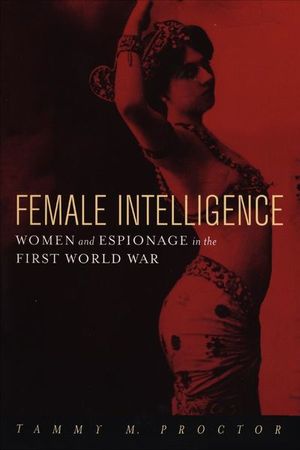Female Intelligence
Published by NYU Press
A history of women who spied for Britain during WWI that “retells forgotten stories and unearths new evidence of intrepid female field agents” (London Review of Books).
When the Germans invaded her small Belgian village in 1914, Marthe Cnockaert’s home was burned and her family separated. After getting a job at a German hospital, and winning the Iron Cross for her service to the Reich, she was approached by a neighbor and invited to become an intelligence agent for the British. Not without trepidation, Cnockaert embarked on a career as a spy, providing information and engaging in sabotage before her capture and imprisonment in 1916. After the war, she was paid and decorated by a grateful British government for her service.
Cnockaert’s is only one of the surprising and gripping stories that comprise Female Intelligence. This is the first history of the female spies who served Britain during World War I, focusing on both the powerful cultural images of these women and the realities, challenges, and contradictions of intelligence service. Between the founding of modern British intelligence organizations in 1909 and the demobilization of 1919, more than 6,000 women served the British government in either civil or military occupations as members of the intelligence community. These women performed a variety of services and represented an astonishing diversity of nationality, age, and class.
From Aphra Behn in the seventeenth century to the famed Mata Hari, female spies have a long history—existing in stark juxtaposition to the folkloric notion of women as chatty, gossipy, and indiscreet. Using personal accounts, letters, official documents, and newspaper reports, Female Intelligence interrogates different, and apparently contradictory, constructions of gender in the competing spheres of espionage activity.
“Proctor attempts to rescue female spies from cliches that classed them as either sexual predators or martyred virgins, manipulators or dupes, heartless vamps or emotional basket cases.” ―The New Yorker
“Useful and engaging . . . an important contribution to the history of British intelligence [that] sheds light on the unglamorous reality of a highly romanticized aspect of women's work.” ―American Historical Review
Includes illustration
When the Germans invaded her small Belgian village in 1914, Marthe Cnockaert’s home was burned and her family separated. After getting a job at a German hospital, and winning the Iron Cross for her service to the Reich, she was approached by a neighbor and invited to become an intelligence agent for the British. Not without trepidation, Cnockaert embarked on a career as a spy, providing information and engaging in sabotage before her capture and imprisonment in 1916. After the war, she was paid and decorated by a grateful British government for her service.
Cnockaert’s is only one of the surprising and gripping stories that comprise Female Intelligence. This is the first history of the female spies who served Britain during World War I, focusing on both the powerful cultural images of these women and the realities, challenges, and contradictions of intelligence service. Between the founding of modern British intelligence organizations in 1909 and the demobilization of 1919, more than 6,000 women served the British government in either civil or military occupations as members of the intelligence community. These women performed a variety of services and represented an astonishing diversity of nationality, age, and class.
From Aphra Behn in the seventeenth century to the famed Mata Hari, female spies have a long history—existing in stark juxtaposition to the folkloric notion of women as chatty, gossipy, and indiscreet. Using personal accounts, letters, official documents, and newspaper reports, Female Intelligence interrogates different, and apparently contradictory, constructions of gender in the competing spheres of espionage activity.
“Proctor attempts to rescue female spies from cliches that classed them as either sexual predators or martyred virgins, manipulators or dupes, heartless vamps or emotional basket cases.” ―The New Yorker
“Useful and engaging . . . an important contribution to the history of British intelligence [that] sheds light on the unglamorous reality of a highly romanticized aspect of women's work.” ―American Historical Review
Includes illustration
BUY NOW FROM
COMMUNITY REVIEWS

